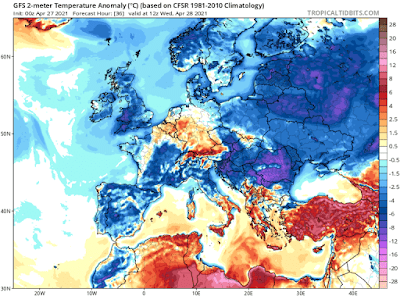The models are in, and the models are grim: the majority of Europe is set on for an extreme May freeze with heavy snow forecast for Scandinavia, the Alps, Germany, and even the UK.
April, 2021 (to the 27th) has been one of the coldest of the past 100 years: not since the Centennial Minimum have Europeans suffered an April this chilly. As reported last week, the UK is on for its coldest April since 1922, with Germany set for its nippiest since 1917, with no signs that the anomalous freeze will let up as the month draws to a close:
APRIL 27:
APRIL 27:
GFS 2m Temp Anomalies (C) for April 28 [tropicaltidbits.com].
In fact, the historic spring chill is forecast to run well-into May, as further Arctic air masses –riding south on the back of a low-solar-activity-induced meridional jet stream flow— invade the lower latitudes:
MAY 3 TO MAY 8:
GFS 2m Temp Anomalies (C) for May 3 to May 8 [tropicaltidbits.com].
The “breadbasket of Europe” (the Ukraine) can expect its fertile lands to suffer temperature departures as much as 20C below the seasonal norm during the first week of May, leading to major crop losses/delayed planting.
Losses will be felt across many European growing regions, particularly in those French vineyards that have already been decimated by record April lows of -8C (17.6F), and beyond. Here, winemakers have taken to drastic action such as lighting thousands of ‘frost fires’ in a bid to stave off the big freeze — these controlled burnings are far from 100% effective though, and are expensive, costing up to €3,000 per hectare.
GFS Total Snowfall (cm) April 28 to May 13 [tropicaltidbits.com].
I don’t know for how much longer the AGW train can deliver that hot and steamy ‘global warming gravy’ to all those controlling elites; but to me at least, its days look numbered.
The COLD TIMES are returning, the mid-latitudes are REFREEZING, in line with the great conjunction, historically low solar activity, cloud-nucleating Cosmic Rays, and a meridional jet stream flow (among other forcings).
Recommend this post and follow
The Life of Earth







No comments:
Post a Comment
Stick to the subject, NO religion, or Party politics